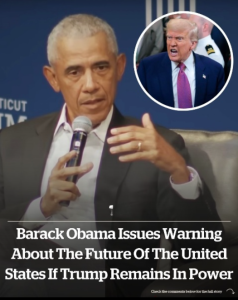Speaking at the Connecticut Forum on June 17, Obama reflected on what he sees as a weakening commitment to the democratic norms that have defined American governance since World War II.
His remarks – which touched on the erosion of institutional safeguards – drew comparisons between current U.S. political behavior and authoritarian regimes abroad.
“This is not consistent with American democracy”
“If you follow regularly what is said by those who are in charge of the federal government right now, there is a weak commitment to what we understood — and not just my generation, at least since World War II — our understanding of how a liberal democracy is supposed to work,” Obama said at the Hartford event, per LBC.
“What we’re seeing right now … is not consistent with American democracy,” he continued. “It is consistent with autocracies.”
What is ‘Autocracy’?
The term “autocracy” has not only been used more and more in online reports in the last few weeks, but online searches for the term have skyrocketed.
Put simply, “autocracy” is a system of government by which one person has all control and absolute power.
Per National Geographic: “An autocratic ruler is accountable to no one; there is no system of checks and balances, no constitutional limit on the ruler’s power, and the ruler is not held accountable by a cabinet of advisors, a system of courts, the people, or the press.”
Obama said: “It is consistent with Hungary under Orbán. It’s consistent with places that hold elections but do not otherwise observe what we think of [as] a fair system in which everybody’s voice matters, and people have a seat at the table, and there are checks and balances, and nobody’s above the law.”
“We’re not there yet completely,” he added, “but I think that we are dangerously close to normalizing behavior like that.”
Concerns Over Trump’s Federal Actions and Protests
Obama’s comments come amid the rising wave of protests across the country in response to federal immigration actions and concerns over government overreach.
One recent incident involved a significant deployment of federal agents in Los Angeles after ICE detained dozens of people, sparking unrest. In response, Trump ordered 4,000 National Guard officers into the city.
The protests, including over 2,000 “No King” rallies in all 50 states, aimed to denounce “authoritarianism, billionaire-first politics, and the militarization of our democracy,” according to CNN. Obama referenced these efforts, praising civil society’s pushback but emphasizing that institutional actors must also take a stand.
“There has to be a response and pushback from civil society, from various institutions and individuals outside of government,” he said. “But there also have to be people in government in both parties who say, ‘No, you can’t do that.’”
“Let’s not go over that cliff”
Obama also warned of the long-term consequences of failing to resist the drift toward autocratic practices.
“It requires [government workers] to take that oath seriously, and when that isn’t happening, we start drifting into something that is not consistent with American democracy,” the former POTUS said. “We need people both outside government and inside government saying, ‘Let’s not go over that cliff because it’s hard to recover.’”
Obama continued: “We now have a situation in which all of us are going to be tested in some way, and we are going to have to decide what our commitments will be.”
Critique of Progressives and Call for Common Ground
Obama also reflected critically on the political left, saying that many progressives during his presidency were able to maintain their values without personal sacrifice. “You could be as progressive and socially conscious as you wanted and you did not have to pay a price,” he said. “You could still make a lot of money. You could still hang out in Aspen and Milan and travel and have a house in the Hamptons and still think of yourself as a progressive.”
He warned that those days may be over. “Now things are a little different,” Obama theorized. “You might lose some of your donors if you’re a university and if you’re a law firm, your billings might drop a little bit, which means you cannot remodel that kitchen in your house in the Hamptons this summer.”
Despite his criticisms, Obama’s tone was not without hope.
“I’m still optimistic — I’m still the ‘hope’ guy,” he said. Addressing young people in particular, he urged them to hold onto their outrage but also to build coalitions.
“It is important to be impatient with injustice and cruelty, and there’s a healthy outrage that we should be exhibiting in terms of what’s currently happening both here and around the world,” he said. “But if you want to deliver on change, then it’s a game of addition, not subtraction, which means you have to find ways to make common ground with people who don’t agree with you on everything but agree with you on some things.”
“The better angels” and the future of democracy
Obama closed by calling for Americans to connect with one another in shared efforts and mutual understanding: “When people actually meet and they get to know each other and then they work on a common endeavor, then what Lincoln called those ‘better angels’ come out.
“People start recognizing themselves in each other and they start trusting each other, and that’s not just the basis for democracy, but that’s the basis for our long-term salvation.”
